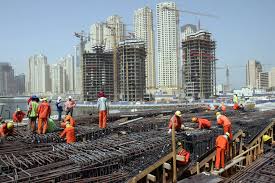The treatment of domestic and migrant workers in the United Arab Emirates (UAE) is deeply troubling as there appears to be an intrinsic crossover between the UAE’s desired economic superiority and the exploitation of hundreds of thousands of workers.
The kafala system, a type of visa sponsorship system, is used in the UAE and contributes to the abuse against migrant workers. The kafala system effectively ties the migrants to their employer, as their visa status is dependent on job performance. The contractual agreements are extremely vague and offer little protections for the migrant workers, while simultaneously reducing their job security. Those who leave their employers without their consent before the end of a contact can face punishment such as fines, prison, and even deportation. This makes it incredibly difficult for workers to get out of abusive situations, including long work hours, unpaid salaries, violence, or sexual abuse.
The United Arab Emirates has the second highest percentage of foreign workers (89%) among all of the six Gulf Cooperation Council (GCC) countries, with neighboring Qatar coming in first place with over 90% of its workforce made up of foreign nationals. Once individuals acquire a work contract and are permitted to enter and work in the UAE they are contractually tied to sponsors. The kafala system requires workers to hand over their passports to their employers, effectively handing over exclusive autonomy of their livelihood. Things like salary, living conditions, nutrition, ability to work elsewhere, and the possibility to return back to their home country are determined by their employer. This control permeates into every aspect of migrant worker’s lives, from finances and nutrition to living conditions and their overall state of mind and well-being. This form of modern day slavery intentionally lacks sufficient government oversight and regulation, as doing so would inhibit the UAE’s future economic development plans.
Domestic workers, who are often migrant workers, are at increased risk of mistreatment and abuse. Of the UAE’s 9.4 million inhabitants, an estimated 70% are low-paid migrant laborers. The hiring of domestic staff has become a symbol among Emirati’s of the wealth and prosperity enjoyed by many at the expense of migrant workers and their cheap labor. The industry has manifested itself into the commodification of the transnational maid trade which provides a cheap and flexible labor force willing to endure low wages. They are no longer seen to be individuals, but objects to be bought and sold in the global marketplace.
Working hours range between 16-21 hours a day without rests or breaks, and domestic workers are also required to work weekends. The average monthly salary ranges between $150 and $200, bringing hourly wages to between 15 and 30 cents. In addition, over a quarter of domestic workers interviewed by Human Rights Watch reported having to sleep under stairwells, in hallways, on living-room floors, or in common living quarters, and some reported having to sleep on the bare floor.
Any attempt at escaping or fleeing your employer in the UAE is punishable by law. Runaway workers have been imprisoned, deported, and face significant financial costs, including paying back their employers for the sponsorship fees without receiving salaries earned. Incurring these large costs can push the workers further into debt, leaving them indefinitely indebted to their abusive employers and unable to escape.
Many abuse cases have been brought into the spotlight, highlighting the violent experiences of domestic workers. A Human Rights Watch report, in which 99 migrant women who were working as maids in the UAE were interviewed, details the harrowing experiences they endured at the hands of their employers. Most of them noted that their passports were taken upon arrival. Others admitted to being subjected to physical abuse and being confined to the home. Failure to pay these women their full wages was also a recurring issue, even when they had been forced to work excessively long hours seven days a week.
Similar parallels of control and mistreatment can be seen within the UAE’s growing construction sector. Migrant workers have been put to work at Saadiyat Island in Abu Dhabi to construct a £17 billion cultural/heritage/tourism hub. It is reported that several thousand workers in the official labor camp on Saadiyat Island in Abu Dhabi were subject to segregation, a 10 pm curfew and monitoring by security guards, and could only enter or leave on authorized buses.
Migrant construction workers also often incur significant debt in order to finance the initial trip to the Gulf, paying inordinate recruitment fees to agencies that can secure them a job in the UAE. Their passports are confiscated upon arrival, the symbolic moment personal autonomy is transferred to the employer. Further difficulty is experienced when contracts are written up and signed in Arabic or English, typically alien languages for incoming workers. Refusal to sign the contract is met with threats of being returned to one’s home country.
The UAE Labour Law 1980 clearly sets out the expected working conditions for migrant construction workers, including the terms of recruitment, maximum working hours, annual leave, and overtime. There are various regulatory, health, and work safety requirements outlined in the legislation also, with compensation guarantees included in the event of a work related injury or death. Additionally, the law stipulates that a minimum wage must be guaranteed in the UAE equal to $2,029 a month. When it comes to migrant construction workers, a majority of these requirements get overlooked, and construction workers in the UAE earn approximately only $175 a month.
The UAE has been complicit in the exploitation of migrant workers, who seek a new start and a more prosperous life, but instead are imprisoned by their new employers upon arrival in the UAE thanks to controlling and restrictive laws and policies. This treatment of migrant workers must stop, and mechanisms must be put in place to help protect the human rights of these vulnerable workers.
Andrew McGill and Angela Modica Scala are Advocacy Volunteers with ADHRB in Ireland





